Films as actor
Beau Brummel (1913)
Principal cast: James Young (Beau Brummel); Clara Kimball Young (Helen Ballarat).
Director: James Young
1 reel
Helen, the daughter of Lord Ballarat, falls for Beau Brummel's charms. Beau is an intimate of the Prince of Wales and a leader of fashion in the early nineteenth century. However, he offends the Prince and is reduced to penury. He is placed in a debtor's prison and Helen sends him five hundred pounds. However, he has lost his mind and goes into a madhouse. His friend, Alvanley, rescues him and he passes his remaining days in dim memories of the past.
The Artist's Great Madonna (1913)
Principal cast: Rogers Lytton (Angelo); Lillian Walker (Toto).
Director: Van Dyke Brooke
2 reels
Angelo, an artist, determined to paint a Madonna, goes in search of a model. He meets a whimsical young woman named Suzette, who offers to pose for him. But at his studio she jumps down from the model's throne and after throwing a kiss to him runs away. He next meets an old acquaintance, named Toto, at a cabaret show who agrees to oppose for him. But as he begins to paint, he discovers that she lacks that Madonna-like expression. He tells her so, and she flies into a rage. She is about to stab him with his palette knife when he is interrupted by the appearance of Marie, sent to Angelo by a friend. Angelo is struck by her beauty and innocent ways and tells her that as soon as she has seen a little of life she will be his great Madonna. In a jealous rage Toto attempts to stab Marie but instead wounds Angelo. Marie nurses him back to health, and they marry. However, Angelo realises that Marie lacks one thing before she become a true Madonna - the humanity of the mother of sorrows. He travels around the world in search of a true Madonna. Only through the intercession of a wealthy friend, does Angelo complete his search - back at the cottage in which Marie is now living, where he finds her nursing their child. He is enthralled by her motherhood. Now he can create his masterpiece, 'The Great Madonna'.
(Moving Picture World, 19 April p. 302)
The Family's Honor
A Tudor Princess (1913)
Principal cast: Robert Brower (Henry VIII); Ben F. Wilson (Duke of Suffolk); Charles Ogle (Cardinal Woolsey); Mary Fuller (Mary Tudor). Director: J. Searle Dawley 2 reels
Henry VIII wants his sister Mary Tudor to marry Charles of Austria but Mary wants to marry Charles Brandon, the Duke of Suffolk. She runs away with the man she loves but Henry sends his guards after them. Brandon is condemned to death by beheading and to save his life Mary consents to marry King Louis XII of France, the latest suitor her brother wants for her. Brandon follows her over and is thrown into a dungeon. The old king soon dies and the throne passes to his nephew, Francis of Angouleme. Francis releases Brandon and, catching her brother in a good mood, Mary persuades him to let her marry her true love.
The Witness to the Will (1914)
Principal cast: William West (Major Thorndyke); Gertrude McCoy (Marjorie Thorndyke); Harry Beaumont (Beldon).
Director: George Lessey
2 reels
Major Thorndyke dies leaving his estate to Marjorie, his grand niece, cutting off his son, Belden. Belden steals the will and the property all goes to him. Marjorie leaves the home rather than be dependent upon him. She cannot earn her own living, however, and is soon in dire poverty. One day, she meets Terence, the Major's groom, whom Belden had discharged. Hearing her story, Terence remembers having witnessed a will shortly before the Major's death and is suspicious. He confronts Belden, who lures him out to the country and hurls him over a cliff. But Terence is not killed and Belden pays the price of his crimes.
(Moving Picture World, 3 January 1914, p. 19)
The Necklace of Rameses (1914)
Principal cast: Marc McDermott (Detective Imbert); Miriam Nesbitt (Diamond Mary); Rex Ingram/Hitchcock (English Jim).
Director: Charles Brabin
3 reels
Diamond Mary steals the necklace from around the neck of a museum mummy, setting in motion a heist drama that takes Detective Imbert and the police across Europe in chase of the stolen jewels.
The Price of the Necklace (1914)
Principal cast: Charles Ogle (Henry Lyons); Miriam Nesbitt (Mrs Henry Lyons); Charles Sutton (Lyons' aide); Rex Ingram/Hitchcock (Lyons' third aide)
Director: Charles Brabin
2 reels
The wealthy Henry Lyons promises his wife the expensive necklace of pink pearls she sees on display. To purchase it he buys thousands of shares then sells them off as their value climbs; then the market crashes. Meeting a woman who has lost all her savings as a result, Mrs Lyons realises the real cost of her greed and vows to spend her life making amends.
The Borrowed Finery (1914)
Principal cast: William West (Grouchy); Maxine Elliott Hicks (Dolly); Rex Ingram/Hitchcock.
1 reel
The only thing Grouchy, the stage-door keeper at the Zephyr Theater cares about is his granddaughter, Dolly. Dolly dreams of dressing up and, one evening, when the leading lady forgets her jewels. Dolly puts them on along with the costume Paul, the boy actor who plays the part of a girl, reluctantly wears. The actress remembers her jewels and goes back to the theatre, demanding to know where they are. Dolly returns just in time to clear up the mystery.
The Spirit and the Clay (1914)
Principal cast: Darwin Karr (Paul); Naomi Childers (Marie); Edward Kimball (Galton); Rex Ingram/Hitchcock (Emil).
Director: Harry Lambart
2 reels
The sculptor's wife poses for the statue. He believes he has embodied her spirit in the clay. After her death, he will not be separated from the statue and falls headlong with it to his death.
Her Great Scoop (1914)
Principal cast: Maurice Costello (Bert Bailey); Mary Charleson (Fanny Stone); Robert Gaillard (Jasper Ray); Rex Ingram/Hitchcock (Horace Bryson)
Director: Maurice Costello, Robert Gaillard
2 reels
Fanny resents a slight and loses her job as a reporter. Fortunately she overhears a plot to rob a bank. Her great scoop lands a gang of thieves in jail and makes her a star reporter and the life partner of the owner of a struggling paper, which bounds into prosperity through the scoop.
(Moving Picture World, 9 May 1914, p. 821)
The Southerners (1914)
Principal cast: Mabelle Trunnelle (Mary Annan); Julius A Mood Jr. (Beverly Annan); Richard Tucker (Boyd Peyton); Rex Ingram/Hitchcock.
Director: Richard Ridgeley
3 reels
Mary Annan is divided in her affection for Boyd Peyton and Robert Darrow. War breaks out between the Southern states and the North, Mary is a true Southerner but Boyd Peyton is torn between his allegiance to the south and his duty as an officer of the United States navy. Believing that Boyd will fight for the South, Mary agrees to marry him. Boyd is torn but announces that he is loyal to the United States. Mary rejects him for Darrow. However, she regrets her decision and writes a letter to Darrow who dies after reading it at the battle of Chickamauga. Her brother, Beverly is killed in the war. Boyd Peyton is wounded on board his ship and Mary nurses him back to health.
Eve's Daughter (1914)
Principal cast: Earle Williams (Richard Cortland); Lillian Walker (a model); Rex Ingram/Hitchcock (a sculptor).
Director: Wilfred North
1 reel
Elevated to high social position by marriage, a young woman hides her former occupation, posing for a sculptor, from her husband. He learns the truth and finds she is more that deserving of his love.
The Crime of Cain (1914)
Principal cast: Dorothy Kelly; James Morrison: Denton Vane; Rex Ingram/Hitchcock
Director: Theodore Marston
1 reel
The two sons of Judge Stone, William and Wylie, are both in love with Nancy Sevier. A group of children pin a placard on Wylie's coattails that reads, 'I am jealous'. Wylie believes it was William and attacks him; shortly afterwards William is found dead with Wylie's gun beside him. Meanwhile, the wife of the real murderer, an Italian vagrant, learns that an innocent man is to be convicted of the crime. She rushes to the courthouse just in time to rescue Wylie. He now realises that Nancy was in love with him after all.
The Circus and the Boy (1914)
Principal cast: Bobby Connelly (Sonny Jim); James Lackaye (The Fat Lady); Rex Ingram/Hitchcock
Director: Tefft Johnson
1 reel
'Sonny Jim' sees the fat woman, the dwarf and all the other freaks. He wants to be one of them. He poses as the tattooed boy. 'Mother Dear' takes him home and after a good scrubbing he is content to stay there.
David Garrick (1914)
Principal cast: James Young (David Garrick); Clara Kimball Young (Ada); Edward Kimball (Ingot); Ingram/Hitchcock.
Director: James Young
2 reels
David Garrick's acting wins the love of Ada. Her father is against the marriage and so Garrick tries to destroy her love. In the end, he wins her father's respect and consent to the marriage.
The Upper Hand (1914)
Principal cast: William Humphrey (Carson); Leah Baird (Mrs Carson); Rex Ingram/Hitchcock (Phillip Blake).
Director: William Humphrey
1 reel
Carson bullies his wife and besmirches her name to claim the upper hand. She suffers in silence. His sudden death proves him a liar and gains her the happiness he denied her.
Fine Feathers Make Fine Birds (1914)
Principal cast: Leah Baird (Lillian Norton); William Humphrey (Harry Norton); Rex Ingram/Hitchcock.
Director: William Humphrey
1 reel
Lillian Norton and Harry, her husband, are very happy, but when the children come along, she is so wrapped up in them she neglects her husband and her own appearance. He takes up with a dancer, Carmela, and becomes infatuated with her. Carmela decides to help Lillian understand why he is neglecting her and sends for her. She dresses her up lavishly advocating that 'fine feathers make fine birds.' As prearranged, Lillian dresses up as Carmela and goes to meet her husband; when he realises his mistake he begs for her forgiveness. Their marriage is patched up and from now on Lillian and the children always look neat.
His Wedded Wife (1914)
Principal cast: Leah Baird (Esther Fredericks); Rex Ingram/Hitchcock (Richard Bentley).
Director: William Humphrey
1 reel
Provided she marries before her 21st birthday, Esther Fredericks is to receive a legacy of $25,000. She refuses to consider Marshe, the younger partner as a husband, when it is craftily suggested by Lawrence, the older lawyer, and seeks the advice of Loring, the old family doctor. Outside his house, she is attacked by a thief, who is routed by Richard Bentley, a friend of Loring's. Later Bentley is badly hurt in an auto accident, and taken to a hospital. As the time is getting short, Doctor Loring suggests to Esther that a marriage of convenience be arranged with Bentley, whose face is concealed by bandages. She agrees and they are married. After the ceremony Bentley sinks back apparently dead. Later the nurse discovers Bentley lives and he eventually recovers completely. Meanwhile Esther, now in possession of the fortune and believing herself a widow, goes to the seashore with her aunt. She is followed by Marshe, who is determined to marry her. Bentley, after leaving the hospital, learns whom he has married, and Dr. Loring sends him to Esther with a letter of introduction under an assumed name. He arrives at the opportune moment to save her from Marshe's forced embrace. Not knowing he is already her husband, she falls in love with him. He proposes and is about to be accepted when Esther learns her husband is alive and well. She is stunned for a moment, but Bentley quickly explains his identity and how he had wooed and won 'his wedded wife'. Her face is radiant with happiness to know that her marriage of convenience is after all a marriage of preference and love. He doesn't contradict it.
(Moving Picture World, 17 October 1914, p. 386)
Goodbye Summer (1914)
Principal cast: Norma Talmadge (Valerie Sperry); Antonio Moreno (Hugo St Clair); Van Dyke Brooke (Louis Martin); Rex Ingram/Hitchcock.
Director: Van Dyke Brooke
2 reels
The cold austerity of her husband is the blight of Valerie's life. Her only consolation is the sunlight and the warmth of her child's love.
The Moonshine Maid and the Man (1914)
Principal cast: Helen Gardner (The Moonshine Maid); Ned Finley (The Man); Rex Ingram/Hitchcock.
Director: Charles L. Gaskill
1 reel
Dave is in love with the mountain girl, Nancy, but she will only marry him if he procures a thousand dollars. He hears that there is a reward of just that amount for information about an illicit still in the mountains. Not knowing that Job, Nancy's father owns the still, he decides to give the information to the sheriff. Nancy goes to the still dressed in men's clothing to persuade her father to give up the still. Dave arrives with the sheriff and in the shoot-out that follows, he is fatally injured. He dies and she is left weeping beside his body.
The Evil Men Do (1915)
Principal cast: Maurice Costello (David Horton); Marie Weirman (Beatrice Elton)
Director: Maurice Costello, Robert Gaillard
3 reels
David Horton and Beatrice Elton are inseparable childhood sweethearts. Fifteen years later, Beatrice goes abroad and is heartbroken to hear that David has married the social climber, Margaret. David is ruined by her extravagance and she elopes with Captain Clifford, the dashing army officer. Clifford tires of Margaret and meets and marries Beatrice. She attempts to reunite Margaret and Horton but Clifford becomes involved; there is a struggle and he accidentally kills Margaret. Realising what has happened, Beatrice tells Clifford it is over between them. He kills himself and Margaret and Horton are reunited.
Snatched from a Burning Death (1915)
Principal cast: Helen Gardner (Joan Le Grande); J.H. Lewis (Le Grande); Nicholas Dunaew (Samson); Rex Ingram/Hitchcock (Chandler).
Director: Charles L. Gaskill
2 reels
LeGrande, the old trapper, has refused to vacate his old hunting grounds and his life is only saved by his daughter, Joan. Samson, who is pledged to the Mexican, Sanchezza, falls in love with Joan. Sanchezza swears revenge. LeGrande builds his home on his chosen site but soon afterwards, Chandler, a young man from the East, comes out with papers indicating he owns the site. Joan falls in love with Chandler. Samson swears to burn the hut to the ground in revenge but accidentally sets fire to it when Sanchezza, who was eavesdropping, is inside. Joan tries to rescue her but Samson prevents her and ties her up; Samson shoots himself and Sanchezza perishes in the flames. LeGrande and Chandler rescue Joan who is now free to marry Chandler.
Camille (1926)
Principal cast: Paul Robeson, Charlie Chaplin, Anita Loos.
Director: Ralph Barton
33 mins
Home movie directed by Ralph Barton, loosely based on 'La Dame aux Camelias'. Rex Ingram is credited on-screen as Charles Stewart Parnell and makes a fleeting appearance grimacing to camera.
Baroud/Love in Morocco (1932)
Films as Director:
The Symphony of Souls (1914), possibly directed by Rex Ingram
Principal cast: Robert Z. Leonard (Earl Dean); Ella Hall (Elaine).
1 reel
A struggling musician lives with his mother in their tenement home. A blind girl who sits at home awaiting the return of her careworn mother listens to him unbeknownst. When her mother dies, the musician and his mother give her a home. The musician sees a notice in the papers from the father of the blind girl's mother asking her to contact him and forgiving her for marrying a man he disapproves of. Although he does not want to lose her, the musician tells the blind girl about the notice. Meanwhile, he has written a symphony inspired by his love for her. Her performs it in the auditorium in front of her and her grandfather and wins her love.
'Not very dramatic or effective'
(Moving Picture World, 8 August 1914, p. 837.)
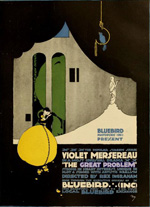
The Great Problem (1916)
Principal cast: Violet Mersereau (Peggy Carson); Dan Hanlon (Bill Carson).
5 reels
A crook steals medicine for his dying wife and is jailed. His young daughter is left all on her own and is caught picking a pocket. The district attorney takes her in and tries to educate her. Just as she is about to marry well, she runs away attired in her street urchin clothing and sells newspapers. Later, she stops a bullet her father intends for the district attorney. She and the attorney marry and he gets his criminal reform bill passed.
'"The Great Problem"is a Bluebird feature written and produced by Rex Ingram. How in the name of goodness anybody could have written such a consistently commonplace scenario is difficult to imagine.'
(Variety, 7 April 1916, p.22)
Broken Fetters (1916)
Principal cast: Violet Mersereau (Mignon).
5 reels
Mignon is kidnapped by white slave traders who carry her off to New York where a young American artist purchases her. He has been disinherited by his father, and plans to make her his model. They fall in love. In the end, the artist is reunited with his fortune and marries the girl.
'The story of "Broken Fetters"has been cleverly written and produced by Rex Ingram. While it takes the spectator in the most insuggestive [sic] way possible into the home of a rich Chinaman, "dealer in merchandise and souls,"in the Chinatown section of New York, the picture is fraught with much sunlight and beauty in the personality of dainty Violet Mersereau, both in the wonderful gardens of the foster-father's home in China, and in the artistically furnished but vice-imbued house of her captor in America. There are also gentle touches of comedy in evidence; and although some might object to the central theme of the play, the sweetness and purity of the girl who passes unscathed through the most dangerous part of her journey toward freedom lifts the tone of the picture above the sordid level to which otherwise it might have descended.'
(Moving Picture World, 1 July 1916, p. 103)
The Chalice of Sorrow (1916)
Principal cast: Cleo Madison (Lorelei); Blanche White (Isabel Clifford); Wedgwood Nowell (Francisco De Sarpina).
5 reels
Lorelei, an American prima donna, captivates the Mexican governor, Sarpina. She promises to give herself to him in order to save her lover who is his prisoner, but then she stabs the governor to death.
'A fine painter could not have managed his shadow effects better.'
(Variety, 29 September 1916, p. 26)
Black Orchids (1917)
Principal cast: Cleo Madison (Marie de Severac/Zoraida); Dick La Reno (Emile de Severac); Wedgwood Nowell (Marquis de Chantal); Francis McDonald/Ivan (George Renoir); Howard Crampton (Sebastian De Maupin).
5 reels
Marie de Severac is a young woman who is engaged to the celebrated artist, George Renoir. Her father Emile observes her flirtatious behaviour and decides to tell her a cautionary tale taken from the novel, Black Orchids, he is currently writing. This story-within-a-story portrays its protagonist, Zoraida, as a serial seductress who attracts the amorous attentions of father, Sebastian De Maupin and son, Ivan. One of Zoraida's lovers, the Marquis de Chantal finally locks her into a dungeon and leaves her to perish alongside the slain Ivan.
'In the early chapters the edifying spectacle is presented of a father and son knowingly making amorous advances to the same woman. That short and ugly statement should be sufficient to damn any piece of fiction. [...] The staging of the film is an almost perfect example of all that moving picture backgrounds should be, and the photography by Duke Hayward, the lighting effects, handling of light and shadow, grouping of characters for stunning picture compositions, are notably good even for Bluebird, whose output has been distinguished for these virtues. For these reasons the error in judgement and good taste referred to is all the more regrettable.'
(Variety, 29 December 1916, p. 22)
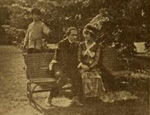
The Reward of the Faithless (1917)
Principal cast: Claire Du Bray (Princess Dione); Betty Schade (Katerina Vlasoff); Wedgwood Nowell (Guido Capanelli); Nicholas Dunaew (Feodor Strogoff).
5 reels
Guido Capanelli is an adventurer. He marries Princess Dione whose father is in ill-health, despite the fact that her father wishes her to marry Prince Feodor Strogoff. Capanelli gains the help of street vendor (of pornographic images) turned reluctant prostitute, Katerina Vlasoff, to kill his wife. They are apparently successful but it turns out that the wife is not dead, only in a trance. Years later the husband is confronted with his wife's 'ghost' and commits suicide.
'Magnus Ingleton wrote "The Reward of the Faithless",which is a story of intrigue and death, carrying home the old punch line of "The Wages of Sin is Death, b'gosh." The tale was filmed under the direction of Rex Ingram, who has turned out a worthy production, and has been released as a Bluebird feature. The detail in the early part of the picture is remarkable and the exterior scenes are unusually good.'
(Variety, 2 February 1917, p.22)
The Pulse of Life (1917)
Principal cast: Wedgwood Nowell (Guido Serrani); Gypsy Hart (Lisetta Maseto); Millard K. Wilson (Stanford Graham); J. Edwin Brown (Luigi Maseto); Nicholas Dunaew (Domenic).
5 reels
Lisetta, daughter of an old fisherman, Luigi, lives on the shores of the Isle of Capri. She dreams of other places, until Serrani, an Italian artist who has lived in New York, chances to see her. He persuades her to go to New York with him. He soon abandons her and she falls in with a bad crowd. Stanford Graham, a sculptor, is looking for a model, and persuades Lisetta to pose for him. They fall in love. Meanwhile, back home, Lisetta's family hears what has happened and her brother, Domenic, travels to New York to avenge her honour and kill Serrani. He stabs him through the heart with a dagger, whose ownership is traced to Graham. Graham is put on trial. On the day of his execution, Dominic confesses that it was him. Lisetta returns to Capri, and after time in prison, Domenic joins her.
'A mediocre story has been given beautiful presentation in this five-reel drama, in which Wedgwood Nowell and Gypsy Harte are featured [..] There are some beautiful photographed sea scenes in the picture. The photography and the production details are the things that make the picture at all worth while.'
(The Moving Picture World, 7 April 1917, p. 116)
The Flower of Doom (1917)
Principal cast: Wedgwood Nowell (Sam Savinsky); Yvette Mitchell (Tea Rose); Nicholas Dunaew (Paul Rasnov); Gypsy Hart (Neeva Sacon); M.K. Wilson (Harvey Pearson); Frank Tokunaga (Charley Sing); Gordo Keeno (Ah Wong).
5 reels
A reporter, Harvey Pearson falls for a cabaret dancer, Neva Sacon. He unwittingly pins a flower on her costume that is the symbol of the Chinese Tong, and as a result she is kidnapped. Turning to his old acquaintance, Charley Sing, Pearson makes a visit to the opium den of Tong leader, Ah Wong and kidnaps the beautiful Tea Rose, planning to swap her for Neva Sacon. Matters become increasingly complicated when a bohemian sculptor, Rasnov, falls for Tea Rose. In the closing sequences Ah Wong grabs Tea Rose as she is about to run off with the sculptor and we leave him sitting dreaming of her.
'The Production is strong in atmosphere and gives a good idea of the average American Chinese quarter. The later scenes contain some interesting melodrama.'
(Moving Picture World, 21 April 1917, p. 453)
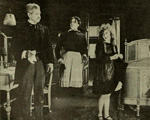
The Little Terror (1917)
Principal cast: Violet Mersereau (Tina and Alice); Sidney Mason (George Reynolds); Ned Finley (John Saunders).
5 reels
Comedy revolving around the pranks of the 'Little Terror' after she quits the circus and goes to live with her wealthy grandfather, taking Rudolph, her pet pig, as her companion.
'The photoplay is just what its name implies, a well meaning picture of slight value in a dramatic way, but full of the kind of romping and fun to be expected from an ingénue heroine. Violet Mercereau acts with easy confidence and wears her short skirts with the unconcern of youth.'
(Moving Picture Weekly, 11 August 1917, p. 957)
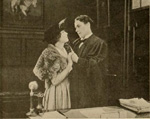
His Robe of Honor (1918)
Principal cast: Henry B. Walthall (Julian Randolph); Mary Charleson (Roxana Frisbee); Lois Wilson (Laura Nelson).
7 reels
A crooked lawyer wins political favours and is made a judge at the Supreme Court. Once appointed he becomes an exemplary character, thanks to the love of Laura Nelson.
'The direction of Rex Ingram isn't up to the acting. There are one or two glaring weaknesses, such as the presence on a jury of an Italian who understands little or no English. The courtroom scenes are loosely handled in matter of detail. "His Robe of Honor"though is an out of the ordinary [sic], decidedly interesting and admirably played.'
(Variety, 18 January 1918, p. 41)
Humdrum Brown (1918)
Principal cast: Henry B. Walthall (Humdrum Brown); Mary Charleson (Alicia Boothe); Joe Harris (Ed Danforth).
6 reels
Hector Brown has earned his nickname 'Humdrum Brown"because of his dull lifestyle. He wishes to marry Alicia Boothe but because of Ed Danforth, his brother-in-law's spending habits, he has to support the entire Danforth family. Danforth robs Brown's bank which is then forced to close. He has to move to San Francisco to find a new job. Alicia inherits a fortune and goes to San Francisco to find him. Her money is robbed and Brown is involved in a last-minute race to catch the crooks.
'There exists in this five-reel production enough pathos and action to please almost all classes of picture patrons. It carries a sympathetic touch that convinces right from the start [...] The direction and the photography are both good and the atmosphere has been capably maintained throughout. The cast supporting Walthall is adequate. Mary Charleson as Alicia presents a charming picture and adds a touch of artistry that adds materially to the value of the film.'
(Variety, 12 April 1918, p. 43)
The Day She Paid (1919)
Principal cast: Francelia Billington (Marion Buckley); Charles Clary (Warren Rogers); Harry Van Meter (Leon Kessler); Lillian Rich (Ardath).
5 reels
Marion Buckely is a Manhattan model. When department store owner Warren Rogers, a widower and father of two daughters, proposes to her, she delays as she has had an affair with Leon Kessler, who promised to marry her. Kessler agrees to say nothing of the affair and she marries Rogers. Kessler visits and proposes to Rogers' teenage daughter, Ardath. Marion then confesses to her affair in order to save Ardath. Rogers throws her out. Kessler continues to pursue Ardath and Marion offers herself to him to save the girl. Rogers overhears and beats up Kessler before taking Marion back.
'"The Day She Paid" is not a society drama, nor is it spectacular or melodramatic, and it has no mysteries or murders. It is just an everyday straightway drama with familiar angles. The settings are all suitable enough to meet the requirements of the story which calls for nothing elaborate. Although the cast is small the four principals portray their respective roles very neatly and effectively. And the direction and continuity are up to present day standards, as is also the photography.'
National Board of Review
Shore Acres (1920)
Principal cast: Alice Lake (Helen Berry); Robert Walker (Sam Warren); Edward Connelly (Uncle Nat).
6 reels
Martin Berry opposes his daughter Helen's marriage to the young doctor, Sam Warren in favour of a moneyed suitor. When Martin loses all his wealth in a property deal that goes wrong, crisis hits. Only the intervention of his brother, Nathaniel, saves him but the cost of Nathaniel's help is that Martin sign over his farm to his wife.
'Excellent presentation by Metro of James A. Herne's play. Arthur J. Zellner in his adaptation arranged the dramatic climax to good effect and Rex Ingram directed competently.'
(Variety, 21 May 1920, p. 43)
Under Crimson Skies (1920)
Principal cast: Elmo Lincoln (Captain Yank Barstow); Harry von Meter (Vance Clayton); Mabel Ballin (Helen).
4 reels
Captain Yank Barstow sets sail for the Yucatan with Vance Clayton, his wife Helen and child Peg as his passengers. Barstow learns that Clayton is transporting a shipment of pianos with concealed arms for rebels. He says nothing as he has fallen in love with Helen. Before they can land, the crew mutiny and Barstow shoots one of the men. When they reach shore, Barstow is arrested and sentenced to five years in prison. He escapes and swims to shore on an island inhabited by beach combers and political exiles. On the mainland, a revolution breaks out and Barstow leads the beach combers against the rebels. Clayton is killed during the riots and Helen is free to settle down with Barstow.
'This may be a far-fetched story, but there is no denying its moving moments. The mutinous crew comprises some genuine types. Frank Brownlee, as the leader, does much to make the action vivid.'
(Motion Picture News, 12 June 1920)
Hearts are Trumps (1920)
Principal cast: Winter Hall (Lord Altcar); Frank Brownlee (Michael Wain); Francelia Billington (Lady Winifred); Joseph Kilgour (Lord Burford); Alice Terry (Dora).
6 reels
The story begins in the home of Lord Altcar, who is determined that his daughter Winifred marry Lord Burford. She is, however, in love with the game keeper, Michael Wain, and they elope. When Altcar discovers what has happened he flogs Wain and separates the couple. Years later, when Winnifred has become lady of the manor, her daughter Dora looks set to follow her mother's destiny, since Burford now wants her for himself, while she wants to marry a young artist. Wain meanwhile has become a wealthy man, and when he finds out what is going on, he attempts to intervene. All comes to a head in a stormy chalet, with Dora being rescued from her fate in the nick of time.
'The locations are supposed to be rural England and Switzerland and these are exceptionally well reproduced. Details of direction are deserving of commendation and the picturizing of a blinding snowstorm with the aid of a little tinting is vivid to a degree.'
(Variety, 28 January 1921, p. 40)
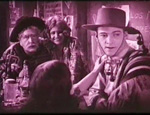
The Four Horsemen of the Apocalypse (1921)
Principal cast: Rudolph Valentino (Julio Desnoyers); Alice Terry (Marguerite Laurier); Pomeroy Cannon (Madariaga); Josef Swickard (Marcelo Desnoyers).
11 reels, 150 mins
Julio Desnoyers is the much pampered grandson of the old Madariaga, and a superb tango dancer. He moves from Argentina to Paris and, on the eve of World War one, falls in love with Marguerite Desnoyers. She, however, is married and when her husband is injured in the war enlists as a nurse. Julio's father, Marcelo Desnoyers, rushes to Villeblanche to save his property and his castle, only to find himself drawn into the war. The Germans carry out terrible atrocities against the French villagers and eventually Julio joins up. He is transformed into a brave soldier and dies in action.
'For it this young director, hardly more than a boy in years, must be accorded a place alongside Griffith. His production is to the picture of today what "The Birth of a Nation"was. For a clear understanding of its artistic and pictorial superiority, comparison with the best of its predecessors becomes necessary. Therefore, be it said that "The Four Horsemen"is the equal of everything that was great in "Intolerance", "Cabiria", "Passion", "Hearts of the World"and "The Birth of a Nation."'
(Variety, 18 February 1921, p. 40.)
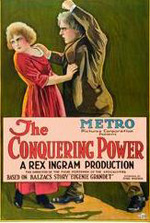
The Conquering Power (1921)
Principal cast: Rudolph Valentino (Charles Grandet); Alice Terry (Eugenie Grandet); Ralph Lewis (Père Grandet).
7 reels, 89 mins
Eugénie Grandet falls for her cousin Charles when he arrives to stay in their home following his father's suicide. The miser Père Grandet ensures that he is sent overseas but eventually Charles returns and is reunited with Eugenie. Adaptation of Balzac's Eugénie Grandet.
'Ingram's work...will demonstrate anew that discovery that we made when we saw "The Four Horsemen" - namely that a motion picture gains immensely in beauty, and therefore in power, when an artist is its director.'
(Los Angeles Times, May 22 1921, III14)
Turn to the Right (1922)
Principal cast: Alice Terry (Elsie Tilllinger); Jack Mulhall (Joe Bascom).
8 reels
Joe Bascom leaves his farm, his widowed mother and orphaned sister to make a fortune in the city and marry Elsie Tillinger. In the city, Joe turns to the left and falls into criminal ways; he is falsely imprisoned and on his release resolves to turn to the right, and go straight. He returns to the farm but two of his old friends from the criminal fraternity follow him there. After a series of comic encounters with country life, Alice Terry's Elsie now comes into her own and, with the assistance of her mother's peach jam, reforms the criminals.
'He has toned down the sentimentality of the story as much as possible without denying it entirely to those who want such, and he has made the comedy subtly, as well as surely comic, surely in that it is real sure-fire stuff, and subtly in that it quietly mocks the story of which it is part. [...] Mr. Ingram has done an excellent job. And, now whey can't he go ahead on something really worth his while?'
(New York Times, 24 January 1922, p. 11)

The Prisoner of Zenda (1922)
Principal cast: Alice Terry (Princess Flavia); Lewis Stone (Rudolf Rassendyll/King Rudolf); Ramon Novarro/Ramon Samaniegos (Rupert of Henzau); Stuart Holmes (Black Michael).
10 reels, 125 mins
Rudolf Rassendyll is related through illegitimate lineage to the royal family of Ruritania. Travelling to that country, he is mistaken for the king. When the real king is kidnapped Rudolf doubles for him but falls in love with the beautiful Princess Flavia, the king's betrothed. He must fool the plots of Black Michael and his dastardly sidekick, Rupert of Henzau, before securing the throne for the Rassendyll dynasty.
'Mr. Ingram's scenes - with a few exceptions - are as satisfactory to the sensitive eye as any that have been made. They have softness, yet they are clear. They have depths, and the spectator sees them easily. This means that they have unity and harmony. They are pictures. They are also animated. Mr. Ingram individualizes his scenes, He makes telling use of facial expressions, He stamps his people with meaning, even when they are only flitting through the action.'
(New York Times, 1 August 1922, p. 14)
Trifling Women (1922)
Principal cast: Barbara La Marr (Jacqueline de Séverac/Zareda); Ramon Novarro (Henri/Ivan de Maupin); Pomeroy Cannon (Léon de Séverac).
9 reels
Remake of Black Orchids
'It is not a pleasant story, but the film is intensely interesting. The acting is unusually good. Miss Barbara La Marr gives a clever study of the new Manon, and Mr Edward Connelly is admirable as the elderly roué who first succumbs to her charms. Mr Lewis Stone gives a subtle sketch of the lover who becomes her husband, and Mr Ramon Novarro is convincing as the third of the amorous trio. Technically, the film is almost perfect, and it says much for the skill both of the producer, Mr Rex Ingram, and of the artists that so sordid a theme is handled with so little actual offence.'
(The Times, 14 April 1923, p. 8)
Where the Pavement Ends (1923)
Principal cast: Alice Terry (Matilda Spener); Ramon Novarro (Motauri); Edward Connelly (Pastor Spener); Harry T. Morey (Capt. Hull Gregson).
8 reels, 70 mins
Pastor Spener and his beautiful daughter, Matilda, live on the Wallis Islands. Hull Gregson, a rough trader, wants to marry Matilda but she is in love with a native man, Motauri. They run away together. Caught in a storm they have to take shelter in Gregson's hut. Motauri and Gregson fight and in the end Motauri throws himself over the waterfall. (An alternative ending, probably not used, reveals that Motauri is a white man and therefore free to marry Matilda).
'Poignant poetry pervades the love scenes of the picture [...] Both Alice Terry and Ramon Novarro in the leading romantic roles accomplish a remarkable variety in expressiveness. Navarro seems to have found a part that suits him perfectly and plays it with the rarest feeling. Miss Terry brings loveliness and a remarkable sincerity to the portrayal of the heroine.'
(Los Angeles Times, 2 April 1923, II7)
Scaramouche (1923)
Principal cast: Ramon Novarro (André-Louis Moreau);Alice Terry (Aline de Kercadiou); Lewis Stone (The Marquis de la Tour d'Azyr); Lloyd Ingraham (Quintin de Kercadiou).
10 reels, 124 mins
André-Louis Moreau vows to avenge the death of his friend Philippe who is killed by the Marquis de la Tour d'Azyr in a duel. He gets caught up in the French revolution, escapes, becomes a travelling player, is hugely successful, then becomes a fencing instructor but eventually returns to the revolution. All along he has been in love with his cousin, Aline. A succession of plot twists reveals his real parentage.
'You might even say that the plot is simply a canvas in the background, and though individual situations have a telling fervor, and there is a steady ongoing allure to what happens before your eyes, the great attraction of "Scaramouche"is not that of drama, but of beautiful and glorious pictures.'
(Los Angeles Times, 18 January 1924, A11)
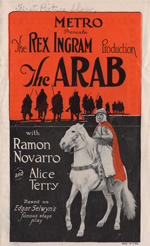
The Arab (1924)
Principal cast: Ramon Novarro (Jamil Abdullah Azam); Alice Terry (Mary Hilbert).
7 reels
Jamil is the son of a Bedouin leader. His father disowns him and he becomes involved with two missionaries, falling in love with the daughter, Mary. He assumes his rightful position as tribal leader in the end and leads his men into battle to save the community.
'This is the finest sheik film of them all. Perhaps it will not be the synthetic money hit that the Hull picture was, which made Valentino and a dull book, which was a mid-Victorian fake that swept the nation's chambermaids off their seats. But "The Arab"is a compliment to the screen, a verification of the sterling repute of Rex Ingram, and withal, a sure financial hit.'
(Variety, 16 July, p.22)
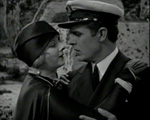
Mare Nostrum (1926)
Principal cast: Alice Terry (Freya Talberg); Antonio Moreno (Ulysses Ferragut); Mme. Paquerette (Doctor Fedelmann).10 reels, 102 mins
Capt. Ulysses Ferragut falls in love with the beautiful Austrian spy, Freya, and abandons his family to help the enemy during the war. His son, Esteban, is killed as a result of his activities. In order to avenge the death of his son and expiate his sins, he turns his ship over to the French and enters the war on their side. Freya is captured and executed as a spy. Ferragut's ship is torpedoed and he sinks to the bottom of the ocean into the arms of the goddess Amphitrite.
'The story takes an unexpected turn and works up to a stirring climax, which is not of the "happy ending"type. Alice Terry carries the role of the spy very effectively, and must win everybody's sympathy for the character, especially in that tense final scene. Antonio Moreno is a splendid opposite - the only fault, perhaps, being that he is more suggestive of the rugged British sea captain than of the Spanish. There are some first-rate foreign actors in the cast.'
(The Irish Times 6 September 1927).
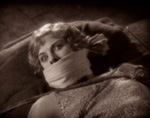
The Magician (1926)
Principal cast: Alice Terry (Margaret Dauncey); Paul Wegener (Oliver Haddo); Iván Petrovich (Dr Arthur Burdon); Firmin Gémier (Dr Porhoet).
8 reels, 83 mins
The Parisian sculptor, Margaret Dauncey has a terrible accident and only survives through the clever surgery of Doctor Burdon. They become engaged but she falls under the influence of the occultist, Oliver Haddo. Haddo steals Margaret away from the doctor and Parisian society and prepares to work his magic on her in order to extract her soul from her body. Burdon and Dr Poerhoet run Haddo down to an evil laboratory in a gothic castle, rescue Margaret and burn the castle to the ground.
'Somerset Maughan's stage play [sic], "The Magician," contains all the ingredients that are necessary to make a successful film. There is a mystery story containing situations and incidents that lend themselves to highly imaginative colouring. With such material at his disposal it is not surprising that Mr. Rex Ingram, expert producer that he is, has made an attractive picture.'
(The Irish Times 11 October 1927)
The Garden of Allah (1927)
Principal cast: Alice Terry (Domini Enfilden); Iván Petrovich (Father Adrien).
9 reels, 96 mins
A young Trappist monk, Father Adrien, while clearing a tree from his monastery in Algeria, accidentally knocks a young girl unconscious. Tempted by her beauty, he gives in to his desires and embraces her as she returns to consciousness. His actions are reported to the order and he is forced to undergo penance. But the call of the world lures him from his monastery and, putting aside his vows of silence, poverty and celibacy, he reverts to his real name, Androvsky, and sets off into the desert. In Beni-Mora, he meets an English girl, Domini (Alice Terry) a devout Christian, and marries her without telling her about his past. They spend their honeymoon in the desert but one night a storm brews and the new wife is lost in the sands. Androvsky turns to God, promising to atone if Domini is found. When this does indeed happen, he returns to the monastery and resumes his vows.
'Mr Ingram, who regards this film, so we are told, as his swan-song in picture production, has qualities which will be sorely missed if this report be true. His eye for grouping, his sense of composition and of light and shade, are responsible for many finely impressive scenes. Thus the scenes in the Trappist monastery are not only beautiful in themselves, but suggest the right atmosphere - so right indeed, that one hoped the inwardness of the book had, this time, survived the remoulding of the subject.'
The Illustrated London News, 7 January 1928
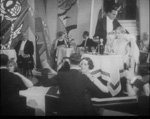
The Three Passions (1929)
Principal cast: Iván Petrovich (Philip); Alice Terry (Lady Victoria Burlington); Clare Eames (Lady Bellamont); Shayle Gardner (Lord Bellamont).
70 mins
Philip, the son of the shipyard owner Lord Bellamont (Shayle Gardner), grows disgusted with his father's pursuit of money and in an act of revulsion joins an Anglican monastery, where he takes up work in a seaman's mission, putting behind him both his father's wealth and the love of his fiancée, Lady Victoria Burlington (Alice Terry). She determines to lure him back to the world and joins him in his work.
'This hokey-pokey wouldn't have meant anything before the talkers and that tells what it's worth now.'
(Variety, 8 May 1929, p. 20)
Baroud/Love in Morocco (1932)
Principal cast: Rex Ingram (André Duval), English-language version; Roland Caillaux (André Duval), French-language version; Rosita Garcia (Zinah); Pierre Batcheff (Si Hamed).
79 mins
André Duval is serving in Morocco. He falls in love with the local girl, Zinah, unaware that she is the sister of his good friend, Si Hamed. The two men fight bravely when an enemy sheikh attacks and Zinah is wounded. André rides off into the desert, forced to leave her.
'It is an unusual entertainment, pleasantly amateurish in its acting, juvenile in its story development and definitely charming in its recreation of the Moroccan atmosphere and the dark beauty of its people as idealized by Mr. Ingram's cameras. The pastel skies, the mountains, and the desert country, the narrow, winding alleys of Marrakech, the flat, white houses and the Moorish civilization make a fascinating background. The picture is flooded with picturesque types - Spahis, African serving women, beggars, dancing girls, bandits from the desert and sinister Europeans.'
(New York Times, 20 March 1933, p. 18)
Films as writer:
The Family's Honor (1913)
Principal cast: Charles Sutton (General Bellina); Mabel Trunelle (Alva Bellina); Richard Tucker (José Bellina), Charles Ogle (Lieut. Adams), Rex Ingram (as Rex Hitchcock).
Director: Richard Ridgeley
1 reel
During the Spanish-American war of 1898, General Bellina is killed in action. José his son, and twin brother of Alva, is at his side when he is killed and the General entrusts him with important information to deliver to another division of the Spanish army. Paralysed with terror José does not carry out his orders. Realising the situation, Alva determines to rescue the family honour. She dresses in her brother's uniform and sets off for the Spanish camp. On the way she is captured by American soldiers and taken to their commander, Lieut. Adams. Alva faints away and shortly afterwards José is discovered to have killed himself. Adams promises Alva that José will have a soldier's funeral and the blot on the family reputation will be forgotten.
Hard Cash (1913)
Principal cast: Charles Ogle (Capt. David Dodd); May Abbey (Mrs. Dodd): Gertrude McCoy (Julia Dodd); Richard Tucker (Alfred Hardie).
Director: Richard Ridgeley
3 reels
On the day of his wedding to Julia, Alfred is confined to a lunatic asylum by his father, to cover up for a crime he committed. The head of the hospital falls in love with Alfred as he tries to prove his sanity and conspires to keep him incarcerated. Eventually, a fire breaks out and he escapes.
Should A Mother Tell (1915)
Principal cast: Betty Nansen (Rose Baudin); Stuart Holmes (Gaspard Baudin).
Director: J. Gordon Edwards
5 reels
The Gaspard family run an inn and have one daughter, Pamela. Her father watches her knitting and demands that she start knitting faster to make them money. Her mother, Rose, tries to defend her as the child is ill. The kindly middle-class Brassard family takes in Pamela and agree to pay off Gaspard. Time passes and the action moves to the aristocratic Gauntier family. Baroness Gauntier's husband has squandered the family fortune and the Baroness is seeking the protection of her aunt, The Comtesse de Montsorrel. The Baron pursues his wife and stays in Gaspard's inn. Gaspard has seen his wife with Philippe de Montsorrel, the Comtesse's son, and informs the Baron of her infidelity. He snoops on the couple and catches them together but Philippe floors him and throws him out of the chateau. Now the Baron tries to blackmail Philippe, and when he is successful Gaspard accidentally knives him as he robs his money. Philippe is arrested for the murder and sentenced to the guillotine. The French authorities torture Rose on the rack as they are convinced she knows something about the murder. Eventually she confesses that Gaspard is the murderer and the film ends with Gaspard's crazed death.
(synopsis taken from scenario)
The Wonderful Adventure (1915)
Principal cast: William Farnum (Martin Stanley/Wilton Demarest); Dorothy Green (Mazora); Mary G. Martin (Eleanor Demarest).
Director: Frederick Thomson
5 reels
Mazora, a beautiful temptress, seduces the wealthy Wilton Demarest. Under his influence, he becomes addicted to opium, and neglects his wife and child. He asks his old friend, Martin Stanley, who closely resembles him, to assume his identity, run his business, and take care of his family. Stanley is reluctant to do so, but accepts as he needs the money. He successfully impersonates Demarest but refuses to sleep with his wife, Eleanor. She realises what has happened, as does Mazora. She threatens to expose Stanley but is killed in a freak accident before she can do so. Wilton dies from an overdose and Martin and Eleanor Demarest settle down happily together.
The Song of Hate (1915)
Principal cast: Betty Nansen (Floria Tosca); Arthur Hoops (Baron Scarpia).
Director: J. Gordon Edwards
5-6 reels
Set in Rome. Baron Scarpia has fallen in love with the beautiful opera singer, Floria Tosca. She is engaged to the artist Maurice Saranof. The Baron has Saranof tortured and, hearing his cries, Tosca relents and reveals the information the Baron wanted. Saranof then rejects her and she gives herself to the Baron while attempting to bargain for Saranof's release. She stabs Scarpia. Saranof is executed and a distraught Tosca climbs the prison wall. She is shot and falls to her death.
Blindness of Devotion (1915)
Principal cast: Robert B. Mantell (Count de Carnay); Genevieve Hamper (Renee Delacroix); Stuart Holmes (Pierre Cavereaux); Claire Whitney (Bella).
Director: J. Gordon Edwards
5 reels
Prologue: Count de Carnay promises to being up his dying friend's son, Pierre, as his own. Fifteen years later: the Count adopts his 17-year old niece, Bella. Pierre and Bella become secretly engaged. However, the count marries the vamp, Renee Delacroix, and Pierre lets himself also be seduced by her, becoming her lover. The count grows suspicious and, to save the man she loves, Bella agrees to become his wife in name only. Pierre realises whose wife Renee is and refuses to see her. Renee plans to poison the count but Renee switches the cups. The count finds out what has happened and Renee shoots himself. The count strangles the dying Renee and throws her body across Pierre's.
A Woman's Past (1915)
Principal cast: Nance O'Neil (Jane Hawley); Alfred Hickman (Howard Sterling/Harrison); Clifford Bruce (Wilson Stanley).
Director: Frank Powell
5 reels
Jane Hawley is a frustrated writer who at the opening of the film receives another publisher's rejection letter. The lascivious editor, Howard Sterling, takes advantage of her naivety and seduces her. She falls pregnant. He refuses to marry her and instead she marries Captain Wilson Stanley, who brings up the child, Harrison, believing him to be his own. He is then posted to the Philippines. Sterling meanwhile has been ruined as a result of illegal dealings and now returns to seduce Jane. Her father-in-law finds her in his arms and banishes her from the house. He also informs Wilson, who now deliberately exposes himself to leprosy. Ten years later: Jane is living in squalor with the drunk, abusive Sterling and Wilson, now cured, returns to America. Seeing his son, he realizes that the boy closely resembles Sterling. He surprises Jane and Sterling in their tenement, a fight breaks out and Sterling is killed. Jane is tried for his murder but at the last minute Wilson breaks into the courtroom, where Jane is being defended by Harrison, and confesses to the crime before committing suicide. Jane and Harrison are reunited.
(synopsis taken from scenario)
The Galley Slave (1915)
Principal cast: Theda Bara (Francesca Brabaut), Stuart Holmes (Antoine Brabaut); Claire Whitney (Cecil Blaine). Francesca Brabaut has married a penniless artist, Antoine Brabaut, against her father's wishes. Now Antoine sends her to her uncle to beg for money. He says he will change his will if she will give herself to him; she refuses. He realises her worth and declares that he will leave her and her child his money but dies before he can change his will. Antoine inherits a castle and abandons Francesca. When she hears that her husband is to marry an heiress she threatens to expose his secret. Francesca and her friend, another artist, are accused of theft and sent to the gallows but the truth is revealed and Francesca shoots Antoine. The heiress and the artist marry.
Director: J. Gordon Edwards
5 reels